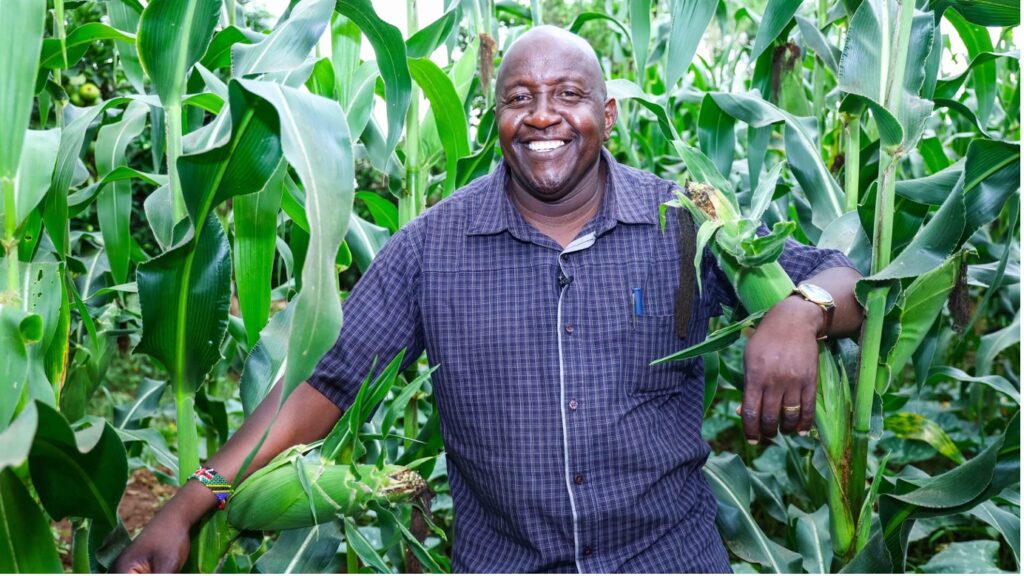
Regenerative Agriculture and Climate Smart Agriculture technologies increase income and crop production in Makueni County.
“Today I don’t regret to have come back to the village as I have good income.”
For many years, smallholder farmers in Makueni County have faced several challenges including adverse effects of climate change, land degradation, declining soil fertility, limited access to extension services and weak input and output market linkages. Low agricultural productivity has resulted to limited participation in agricultural markets leading to increased food insecurity, poor household nutrition and weak economic resilience among smallholder farmers.
To break the cycle, AGRA and implementing partner CGA have focused on Scaling Out Regenerative Agricultural Practices in eastern Kenya. The project aims to improve food security, community and ecosystems resilience through adoption of regenerative agriculture and climate smart practices and technologies among smallholder farmers and to strengthen the community-based public-private extension system in the county.
Justus Kimeu is a 46-year-old farmer and father of four children and the chairperson of the Makueni Conservation farmers CBO in Kathiani Village, Makueni County. He earns most of his money from farming. Kimeu quit his job as a social worker in 2007, returned to the village and went direct into farming.
But despite the success of his first try in farming, Kimeu knew that he had a lot to learn about farming. “Like in any profession, agriculture needs training and updating knowledge and practices. I lacked deep knowledge of farming and instead used conventional farming practices,” he confessed.
In 2020, Kimeu received Regenerative Agriculture training and support from CGA by a Village Based Advisor (VBA) through a mother demo plot established at Kithoni. He attended weekly training to learn better farm practices, such as land preparation, timely planting, proper spacing, row cropping, crop rotation, mulching, intercropping of cereal and pulses that fix nitrogen from the atmosphere, and conservation agriculture. After weeks of training, Kimeu received improved seeds with the help of the VBA from input suppliers and later established a baby demo farm.
“I now use principles of regenerative agriculture, such as crop rotation, crop residue retention, crop cover crops and minimum tillage to help the soil give its maximum output,” says Kimeu.
Using the Village Based Advisors (VBAs) business model, the project demonstrates improved RA practices and technologies, using Mother-Baby approach. This approach facilitates farmer learning from the demonstration site – ‘mother’ and trialing on their own plots – ‘baby’. Comparison is then made on performance of ‘mother and baby’ plots to assess level of learning and adoption of trained practices and technologies by farmers.
“Before the project began in Makueni, my yields were very low due to traditional farming techniques and poor farming practices. I would only harvest 3 -10 bags of maize in the 3 acres. Now I harvest an average of 40 to 60 bags in 6 acres,” says Kimeu.
“Since I started using these regenerative agriculture practices and technologies, my production costs have decreased between 20-30 % while my crop yields have increased from 1 bag – 3.3 bags per acre to 6.7 bags – 10 bags per acre depending on the season. Today I don’t regret to have come back to the village as I have good income,” added Kimeu.
As a result, he is now considered a resource person on the use of Regenerative Agriculture and Climate Smart Agriculture practices in his village. With the earnings from his farming, Kimeu is paying for his children’s education and has heavily invested in water harvesting tanks at his homestead. His rain harvesting systems efficiently captures enough water to leave him with over 200,000 liters at any point in time, enough to not only run his homestead but practice crop irrigation as needed.
Kimeu is a firm believer in the principles of total sustainability, and this is evident from his superbly developed farm, which is designed to ensure it is self-sustaining in every way. Kimeu has deployed the practices of RA, including intercropping, mulching, cover crop and soil and water conservation practices such as terraces.
He plants different crops (green grams, maize, beans) every season to increase moisture and fix nitrogen in the soil. He has also planted over 1,000 trees around the farm, effectively acting as windbreakers and protecting crops such as maize from strong winds.
“I plant green grams, or maize and beans in between the citrus trees. For weeding, I use a shallow weeder,” says Kimeu, who has been farming for over a decade now. He does not use the burn, or slash methods of clearing the farm because these are methods that leave the land bare, exposing the soil. If it is beans or greengrams he plucks the pods and leaves the stock,” he said.
Kimeu has introduced underneath water basins to collect and retain water during dry seasons and is using organic fertilizers. He also incorporates cover crops such as beans, green peas and pigeon peas, pumpkins, sweet potatoes, and watermelons. These crops help in weed management, prevents direct sunlight exposure to the soil. They also help in maintaining soil moisture and fixing nitrogen into the soil.
Today, many smallholder farmers from Kathiani village are inspired by his success and are now able to increase their income without damaging the environment by using regenerative agriculture and climate smart agriculture practices and technologies.
With AGRA’s support, CGA’s Regenerative Agriculture project trains smallholder farmers in Makueni to boost their production, minimize post-harvest losses, and improve their marketing skills through business to business (B2B) linkages. Across Makueni County, CGA is currently training over 10,000 farmers on RA through Village Based Advisors to improve their production and connect to markets.
The Regenerative Agriculture project is supported by Alliance for a Green Revolution in Africa (AGRA) through the IKEA Foundation and implemented by Cereal Growers Association (CGA).
